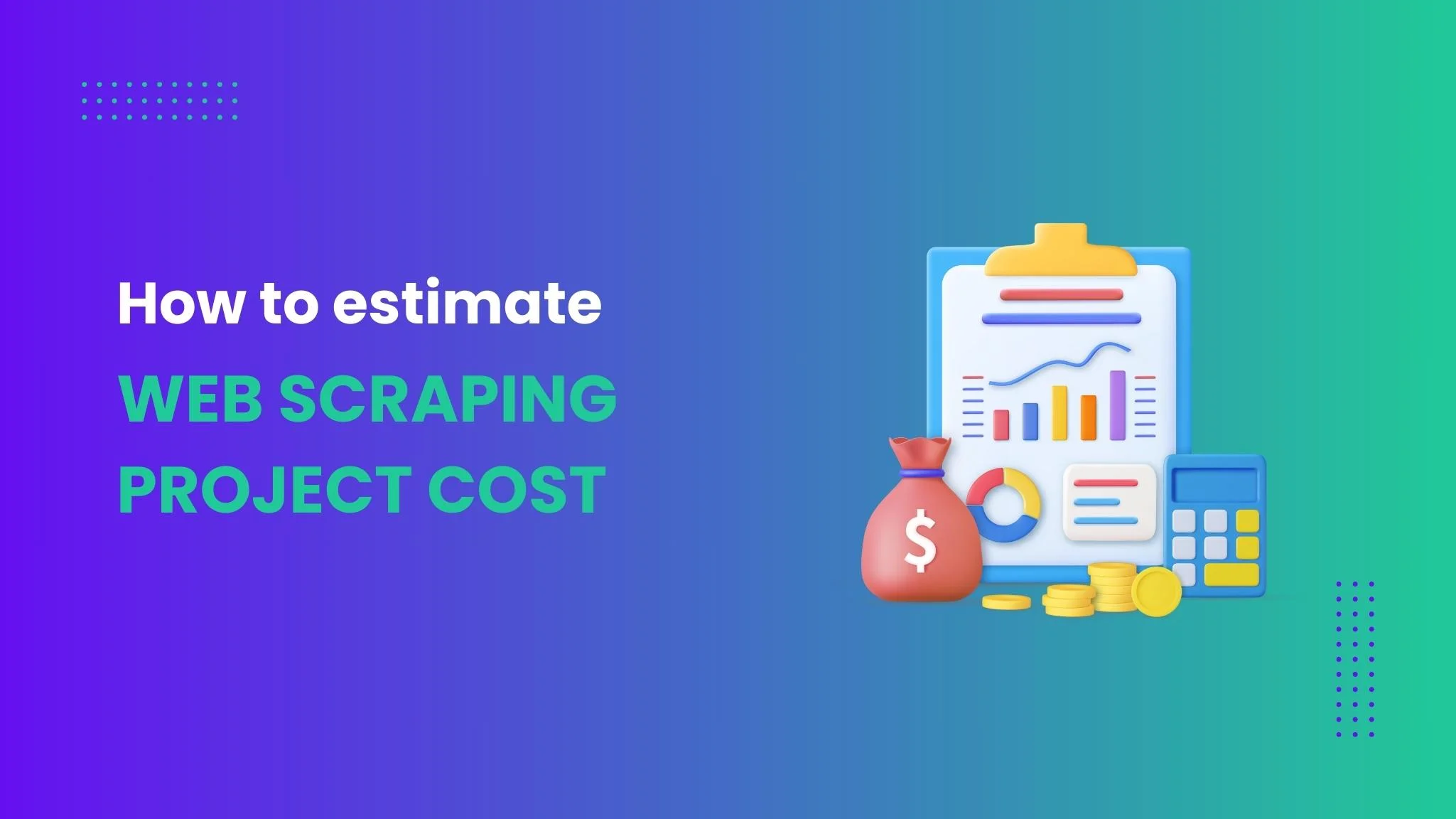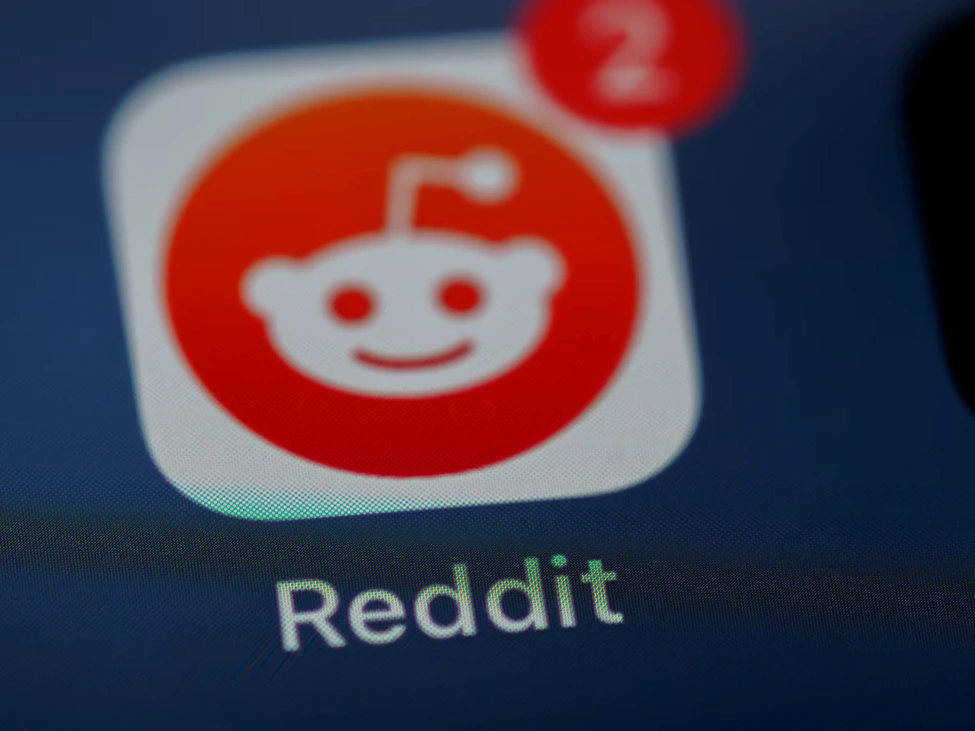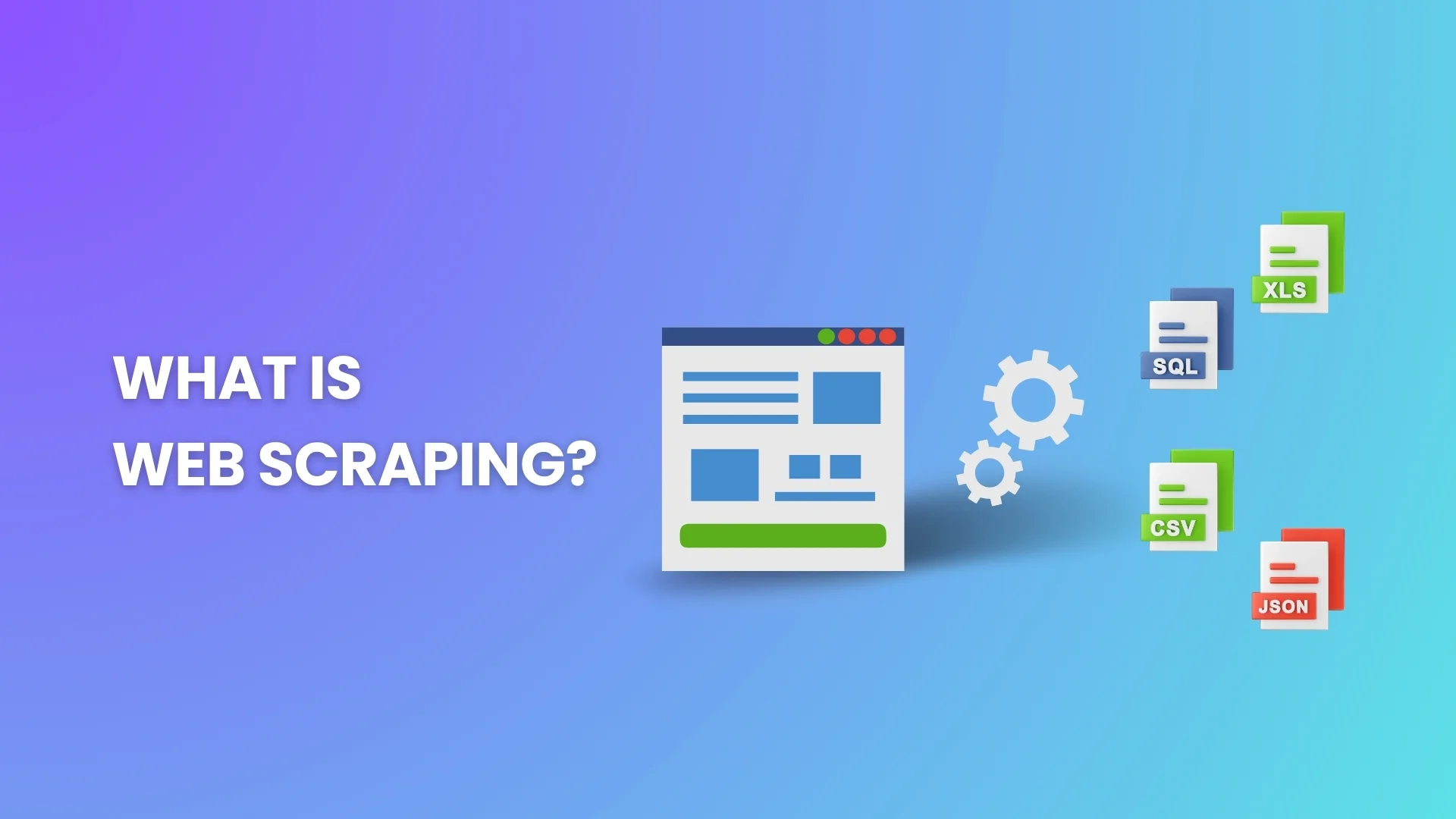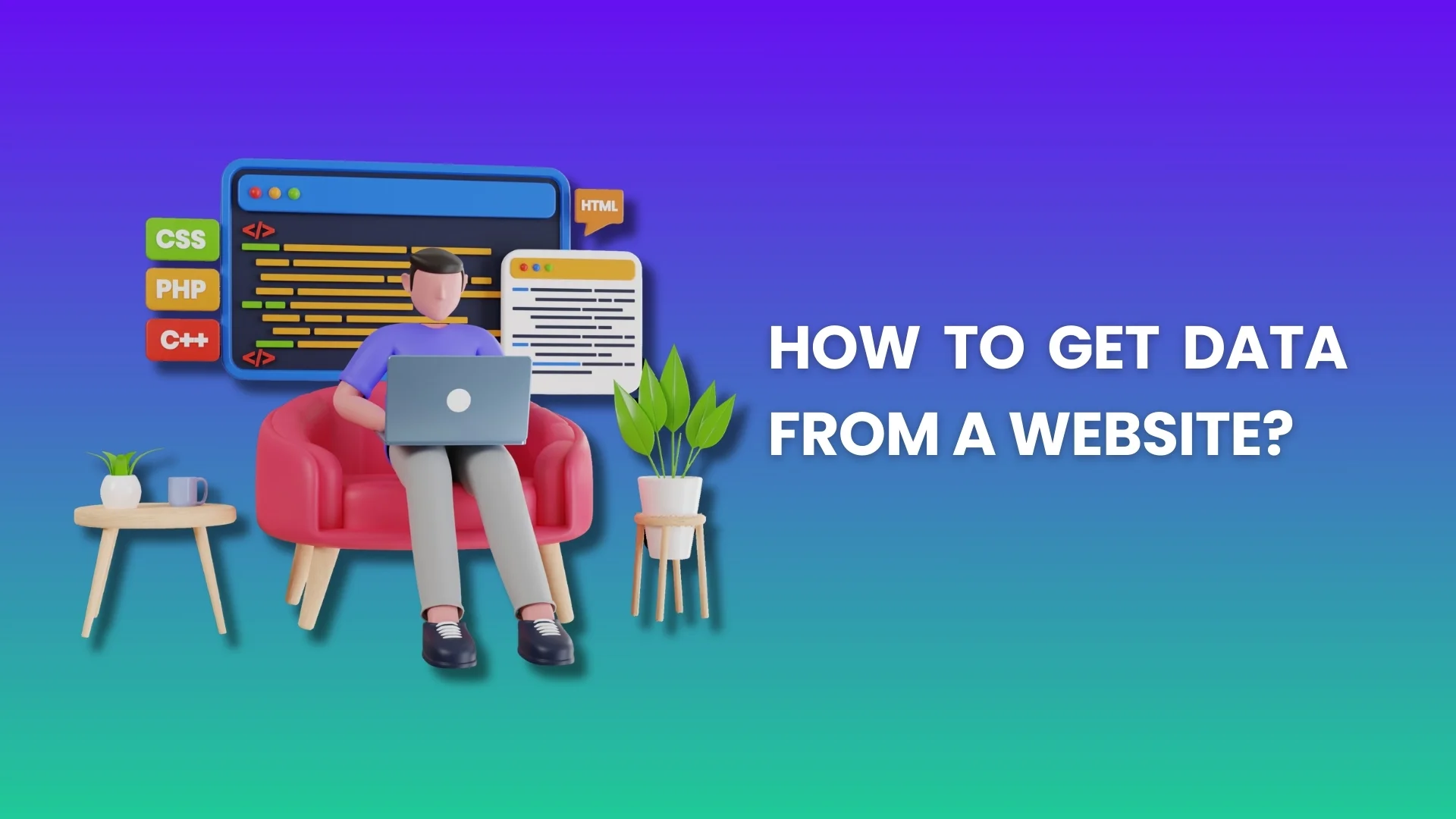When it’s time to choose a vendor for handling your web scraper project, what often stands between you and your data-driven goals is the cost.
Did you know that 58% of companies are keen to revisit the pricing structure with their outsourcing partners? What it means is that more than half the market looks for a clearer picture of what they’re investing in.
But let’s face it. Pinning down the exact cost for data scraping isn’t always possible. Because each project is as unique as the data it targets. The volume of information, the complexity of the websites, and even the frequency with which you need that data make a difference in terms of the data collection cost. And it doesn’t end there.
So, we’re here to unpack all this. We’ll break down what factors affect the final cost of web scraping as a service.
How much does web scraping project cost: Breaking down the project price
Defining the cost of a web scraping project is akin to asking “How long is a piece of string?” The answer is: it depends. Too many variables come into play as you calculate the final price tag of scraping websites. Namely, these are:
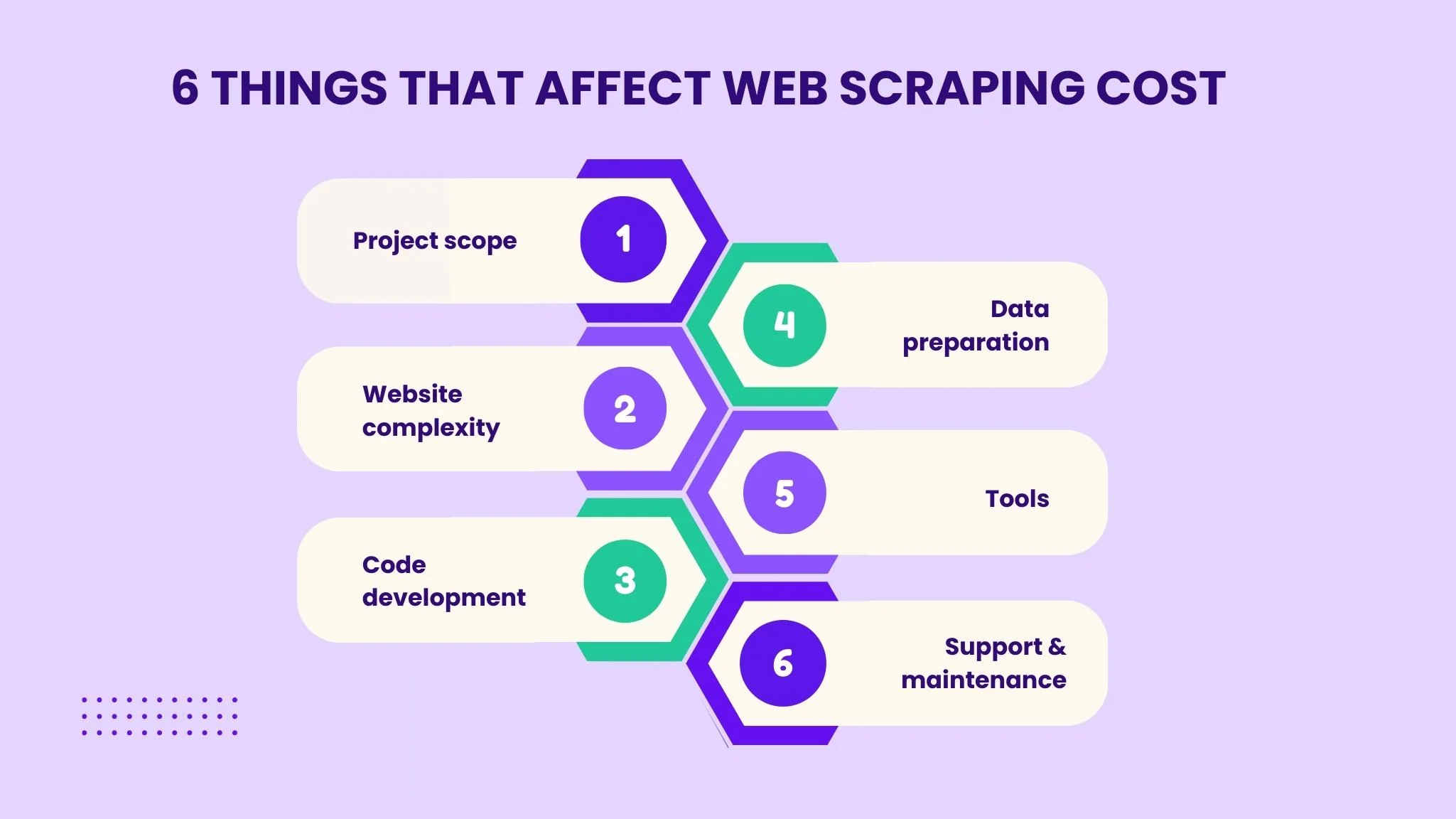 Let’s break down the usual things that affect your final quote in more detail in the next sections.
Let’s break down the usual things that affect your final quote in more detail in the next sections.
1.Project scope
There’s no one-fits-all approach to custom web scraping. If you need to scrape 30 simple websites that don’t change their structure or content much, and don’t have rigid protection measures, it’s one thing. But scraping Amazon and other marketplaces, with hundreds of categories, complex page structures, and different data types is a whole different story.
So, what project details define the data collection investment size?
- The number of websites. It’s simple. Each additional website adds layers to the project. So, the more websites you need to scrape, the larger the scope. And subsequently, the higher the price.
- The number of records. The more volume you require, the more resources, time, and processing power it will take. Larger datasets require more robust infrastructure to handle the load, more storage, bandwidth, and time to clean and verify the data.
- Data formats & types. Structured data (organized in tables or lists) is usually easier to work with. Unstructured data takes more effort to find and collect. And if you need to use OKR for images, that’s another level of complexity.
- Data delivery frequency. How often do you need your data delivered? Is it a one-time affair, or are you looking for a regular data stream? While one-time scraping is usually limited to a single harvest, you’ll need more hands-on and a different pricing structure with regular scraping.
- Turnaround speed. The quicker you need data, the more resources we need to allocate to meet your deadline. This means prioritizing your project over others. When defining the speed, we usually consider scraper implementation time (from a few hours to 4 days), data loading time (from minutes to days), and the number of concurrent load processes (from one to multiple chunks).
- Data loading speed. (records + search complexity + number of search requests = if the website shares data fast - it takes minutes to load data. complex search with many requests from 1 hour to 7 days.
Note!
Data loading speed and the number of concurrent processes will mainly depend on website responsiveness. Sometimes, we load data within minutes—because the website is responsive. In other cases, it takes days.
In turn, the speed at which you can load data relies on the number of records, search complexity, and the number of search requests. For example, if the site shares data fast, it will take minutes to get data. On the contrary, to complete a complex search with many requests, developers can spend from 1 hour to 7 days.
| Project Specification | Lower price range(up to $500) | Medium price range (from $500 to $5,000) | Higher price range (above $5,000 |
|---|---|---|---|
| Number of websites | 1-2 simple sites | 3-10 average sites | 10+ sites |
| Number of records | 1,000 - 10,000 | 10,001 - 1,000,000 | 1,000,001 and above |
| Input data formats & types | Structured data (price, description, ratings, and SKU numbers) | Semi-structured data (HTML or XML files) | Unstructured data (emails, PDF files, or images) |
| Quality control | Raw data | Verified data | Standardized and ready-to-use information |
| Data delivery frequency | One-time | Monthly | Daily or real-time |
| Turnaround speed | Is defined by:
|
||
2.Website complexity
Some websites are open fields. Others are dense forests. So, the more complex the website is, the pricier it will get to fetch data from it.
Website structure Before estimating the web scraping service cost, we always look at the website structure. Sure, a well-structured website with clear, consistent HTML elements, straightforward URLs, and a sitemap is a dream for every developer. Scraping information from these sources is usually less time-intensive. Which means a lower cost for you.
Not all websites are built with such clarity. Some hide data behind layers of menus, and tabs. Others have dynamic content that loads as you interact with the page. Also, they may use intricate JavaScript, AJAX, or employ frameworks like AngularJS or React.
In such cases, we need more advanced tools and strategies. Our developers might have to employ headless browsers that mimic human interaction. Or write complex code that navigates through the complex websites. This naturally impacts the project’s cost.
Anti-scraping measures
The level of website protection will also impact the cost of the data scraping services.
IP blocking is a common protection tactic. Websites use it to block access if they notice too many requests from the same IP address. To outmaneuver such blocks, we may need to use a pool of rotating IP addresses or residential proxies. Usually, the price ranges between $100-$300 per month.
If you would like to access information locked by login, this adds another dimension to our web scraping task. To legally access these sites, we’ve got to manage accounts and sessions.
Lastly, there are CAPTCHAs. And here, there are two solutions. First, we can automate solving CAPTCHAs with sophisticated anti-captcha services (from $0.5 to $2 per 1000 solved CAPTCHAs).
| Cost range | Website specifications | Measures that impact the cost |
|---|---|---|
| Lower (from $10 to $100) |
|
|
| Mid (from $100 to $500) |
Simple anti-scraping measures Dynamic content loading Some use of JavaScript/AJAX Basic login requirements |
|
| Higher(above $500) |
|
|
3.Code development cost
The average salary of a middle developer in Ukraine is around $2,500. So, let’s break this down into an approximate hourly cost. For simplicity, let’s consider a standard work month of 160 hours (which is 40 hours per week multiplied by 4 weeks).
Here’s the basic calculation for the hourly rate:
💰 $2500 average salary / 160 hours per month = approximately $15.63 per hour
Now, we’ll consider how different levels of project complexity affect the code development cost.
As you hire web scraping developers for simple projects, development time is typically reduced. The tasks will include basic data extraction from several websites and no anti-scraping mechanisms.
Projects of medium complexity might involve dynamic content and some anti-scraping measures. So, it will require a developer to write code capable of overcoming those complexities. Usually, there is a need for some form of data processing, which also requires extra time.
To implement a complex project, a developer usually deals with websites known for intricate structures, heavy use of JavaScript, and strong anti-scraping measures. Also, the need to handle a large volume of data or fast-changing information doesn’t make things any easier. So, it requires a significant amount of time for both the development and the execution of the scraping tasks.
Here’s how this might look:
| Project complexity | Estimated development time | Estimated cost |
|---|---|---|
| Simple | 3-4 hours | $50 - $100+ |
| Medium | 7 hours | $100+ |
| Complex | 3-4 days | $375-$500+ |
*The estimated development time is a rough guide and will vary according to the specific details of each project. For the most accurate estimate, please contact us at dev@nannostomus.com.
4.Data post-processing
In our experience, data processing accounts for around 80% of the project’s overall time and cost. Take, for example, our India Voter Registration Poll project. Processing about 1 billion records and recognizing data in 14 different languages wasn’t a small feat—it took 9 months. So, what exactly is included in this scope of web data extraction?
- Loading data. Approximately $50 per website, as seen in our project, where we gathered comprehensive data about sex offenders across the USA. This cost can increase with the complexity of the source website and the volume of data.
- Data cleaning. Can vary widely. For smaller projects, we clean data on the fly as we load data. In other cases, the cost can start at $50 and increase based on the range of activities.
- Data validation. Basic validation can start as low as $500. But for more elaborate validation protocols involving cross-referencing and multi-step verification processes, costs can escalate.
- Data transformation. Might range from $750 for simple transformations to several thousand dollars for extensive data sets.
- Data integration. The cost can start around $1,000. But as the number of data sources and complexity of the integration increases, so does the cost.
- Data enrichment. Begins with $1,500 and increases based on the data sources used for enrichment and the volume of data.
💡 These costs are influenced by the labor market. For example, the rates for hiring web scraping developers in Ukraine might be different compared to other regions.
5.Tools
Each tool in the tech stack of data scraping companies has its price tag. The investment into this expense item will largely depend on the project’s specific demands and the chosen service providers. Additionally, costs can fluctuate based on market conditions, regional pricing, and the evolution of technology.
Servers
The cost here varies based on the server’s performance specifications, required uptime, and scalability. For a project with moderate demands, you might expect costs starting from:
- Entry-level cloud server: Starts from around $40 per website scrape.
Storage
This cost depends on the amount of data you’re storing and the duration of storage. With cloud storage solutions, you typically pay for the amount of storage you use per month. Here’s a rough estimate:
- Starts from $0.020 to $0.040 per GB per month.
- So, for storing 1 TB of data, you could pay approximately $20 to $40 per month.
Additional tools
Depending on the project, web scraper freelancers or vendors may need specialized software or subscriptions to services that facilitate scraping.
For using proxies for web scraping, you’ll usually be charged based on the amount of traffic they handle and the level of IP rotation you need.
- Shared proxies: From $50 to $300 per month.
- Dedicated residential proxies: Ranges from $300 to $1,000 per month.
If the website is protected with CAPTCHA, developers will need to use dedicated solvers. Here, you usually pay per solved CAPTCHAs. So, costs can add up quickly for sites that heavily use them. Estimates might range from $2 to $5 per 1,000 CAPTCHAs.
6.Support & maintenance
Not every web scraping project requires ongoing support and maintenance. For example, if you’re interested in a one-time scrape, the job is done once the required data is collected and delivered to you.
But as you need data on an ongoing basis, you won’t do without maintaining the scraper. First, you’ll want to track the results of scraping activities. Second, many websites change regularly. And if you require up-to-date information, this involves changing the code. This could be daily, weekly, or monthly—depending on the website and your needs.
Usually, it takes 2-3 developer’s days to revisit the code and maintain the scraper. Also, based on our experience, 1-3 websites out of 30 will require code updates due to the changes. So, let’s compare the costs. Mind that third-party and other services (cloud,
| Type of work | Cost | What's included |
|---|---|---|
| Initial setup | From $50 to $500 one-time payment per website |
|
| Support & maintenance | Starting from $500 per month |
|
At Nannostomus, we tailor our support and maintenance packages to the specific needs of each client. Pay only for what you need.
So, how much do web data scraping services cost?
Let’s break down the potential costs involved in three common service scenarios:
- One-time scrape of 10 static websites
- Initial scraper setup for 10 websites with basic anti-scraping protection + support
- Initial scraper setup for 10 websites with severe anti-scraping protection + support
One-time scrape of 10 static websites
Static sites are easier to handle. Here, the data is readily accessible. So, developers don’t have to deal with complex navigation or bypass anti-scraping technologies.
- For a one-time project like this, you could be looking at an estimated range from $1000 to $1,500. This would cover the data extraction and delivery in your desired format.
10 websites with basic anti-scraping protection + support
This scenario involves setting up scrapers that handle websites with basic anti-scraping measures. Mainly, simple CAPTCHAs or IP rate limitations. Plus, we add ongoing support to the quote.
- The initial setup will range from $5,000 to $7,000.
- Ongoing monthly support for these sites might be in the region of $700 to $1,000.
10 websites with severe anti-scraping protection + support
Websites with strong anti-scraping measures require sophisticated solutions from our end. They usually employ advanced CAPTCHAs, extensive JavaScript, AJAX content loading, and aggressive IP-blocking strategies.
- For such complex tasks, initial setup costs could range between $10,000 and $15,000.
- Monthly support could be anywhere from $1,000 to $2,000 per month.
In the chart below, you’ll find a simplified guide to understanding the potential financial commitment for each web scraping scenario over the course of a year.
| Service scenario | Initial setup cost | Monthly support cost | Total cost for 1 year |
|---|---|---|---|
| One-time scrape of 10 static websites | $500 - $1,500 (one-time) | n/a | $500 - $1,500 |
| 10 websites with basic anti-scraping | $5,000 - $7,000 | $500 - $1,000/month | $13,400 - $19,000 |
| 10 websites with severe anti-scraping | $10,000 - $15,000 | $1,000 - $2,000/month | $22,000 - $39,000 |
Get a price estimate from Nannostomus website scraping company
Whether you require a one-off data scrape or an ongoing stream of fresh data from sites ranging from simple to highly complex, we’ve got the tools, the talent, and the adaptability to meet your needs. Here’s our pledge to you:
- Customized pricing. You won’t find one-size-fits-all pricing here. With us, you only pay for what you need—no more, no less.
- Try before you buy. We offer a pilot project at no cost. For example, are you thinking of scraping data from 10 websites? Let us demonstrate our capabilities—we’ll deliver sample data from one of those sites free of charge.
- Payment plans. We offer installment payments for long-term projects. For example, rather than paying an upfront cost of $5,000 for the initial scraper setup and budgeting support, we’ll break down the total payment into 12 equal payments of roughly $1,200 each month. This way, you get the services you need while maintaining cash flow for your business.
We make enterprise-level website scraping services available for every business. Get quality data regularly to empower timely decision-making. Reach out to us for a quote.
